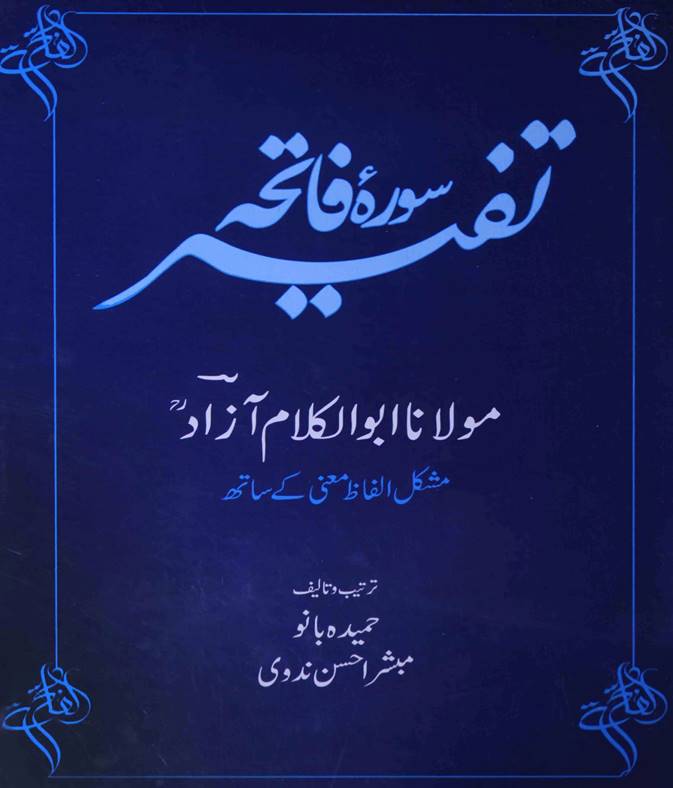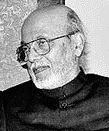
If there be one sentence that would summarize the Tafsir of the Maulana, it is this: one God, one Book, one Religion, one Humankind parsed into groups each with its Shar’a, Minhaj and Nusuk (paths to worship, rules, regulations and rites). Rarely, if ever, has the idea of Tawhid and the universal brotherhood of humankind been presented with such clarity, conviction and compulsive power. This conviction of the Maulana explains his steadfast adherence to politics of communal reconciliation transcending divisions based on religion even while his surroundings were lit by fires of parochial madness borne of hatred of “the other”.
Maulana Azad’s Tafsir on Sura-e- Fatiha New Edition Released
By Dr Nazeer Ahmed
Concord, CA

Some literature is timeless. The rest is consumed by time. The masterful tafsir of Sura-e-Fatiha in Urdu by Maulana Abul Kalam Azad falls into the first category. It opened up the sublime beauty and cosmic grace of the Qur’an to the Urdu-speaking world. For more than a century, millions around the world read and learned from this masterpiece. Now, it has been recompiled by Hamida Banu and Mubashshir Ahsan Nadwi and has been published by Ustada Hamida and Professor Anil Chopra of the San Francisco Bay Area in English as well as Urdu.
The Chopra family is no stranger to our Urdu-speaking readers. Their life-long, passionate dedication to the preservation and promulgation of the Urdu language and poetry is recognized and appreciated by audiences across the oceans, in India and in North America.
Maulana Azad was a literary and political giant of his era and a principal player in India’s long and arduous struggle for freedom. He served as President of the Indian National Congress in the crucial war years of 1940-45. Along with Gandhi, Jinnah, Nehru and Patel, he is recognized as one of the Big Five who shaped the South Asian political landscape that emerged after the British period. Post-independence, he served as the Education Minister in the Nehru cabinet (1947-58) and was responsible for establishing the IITs whose graduates have gone on to dominate the world of information technology in modern times and have turned India into an IT powerhouse and a principal player in space exploration.
Azad was a respected scholar in Arabic and a consummate orator in Urdu. Tarjaman ul Qur’an was a masterpiece; it won the approval of ulema worldwide and was applauded for its eloquence in the Urdu-speaking segment of the subcontinent.
The Maulana wrote the Tafsir for three audiences: Tarjaman ul Qur’an for the general public, Tafsir al Bayan which enunciates the principal ideas in the Qur’an and Muqadamma e Tafsir which discusses the purposes of the Qur’an.
The writing, publication and release of the Tafsir on Sura-e- Fatiha, which was the first part of Tafsir ul Qur’an, reflects the turbulent times in which the Maulana was a principal actor. The first manuscript, completed in 1916 was seized and destroyed by the colonial British authorities as part of a crackdown on dissident Indian voices at the height of the First World War. The Maulana was arrested and incarcerated. When he was released in 1919, he set his pen to paper and by 1921, prepared a second version. By then, Maulana Azad was in the thick of the Khilafat and Gandhi’s non-cooperation movements. He was arrested once again, his home was searched, ransacked and all of his writings - handwritten, printed or lithograph - were seized. When they were returned in 1923, the material had been so badly damaged that it could not be used. It was not until 1930 that Maulana Azad could muster the enthusiasm and stamina to complete the work a third time. This time it was successfully published.
The Maulana divided his Tafsir of Sura e Fatiha into seven parts: Fatiha, Hamd, Rububiyet, Rahmat, Adalat, Tawhid and Hidayat. If there be one sentence that would summarize the Tafsir of the Maulana, it is this: one God, one Book, one Religion, one Humankind parsed into groups each with its Shar’a, Minhaj and Nusuk (paths to worship, rules, regulations and rites). Rarely, if ever, has the idea of Tawhid and the universal brotherhood of humankind been presented with such clarity, conviction and compulsive power. This conviction of the Maulana explains his steadfast adherence to politics of communal reconciliation transcending divisions based on religion even while his surroundings were lit by fires of parochial madness borne of hatred of “the other”.
The Tafsir places great emphasis on evidentiary reasoning. This approach sets it apart from traditional tafsirs and constitutes a breath of fresh air in the discipline of Qur’anic exegesis. Indeed, it can be claimed that the Maulana is the first one to take a “scientific approach” to a study, understanding and presentation of the Qur’an and of the Deen of Islam.
Let us illustrate our observation with an example from the chapter on Rububiyet which the Maulana subdivided into eleven Sections. In the Section on Appeal to Reason, he observes: “The primary and the most important function of presentation observed by the Qur’an is the appeal to reason that it makes. It lays repeated emphasis on the search for truth, and on the need of exercising one’s reason and insight and reflecting over the inward and outward experience of life and drawing valid conclusions. In fact, there is no chapter in the Qur’an wherein it has not made an earnest appeal to man to reflect over everything”.
The Maulana is a deep thinker. While others would be satisfied in translating Hidayat as guidance, his incisive intellect dives in and divides it into three categories: “One is the Hidayat of instincts and this is innate in animal life. Next to instinct is the Hidayat of senses which is higher in rank than the former. This provides us with the talent for seeing, hearing, tasting, and smelling by means of which we gather a knowledge of the external world of relations. In man, there exists a third type of Hidayat and that is the Hidayat of reason. It is this third variety of directive force provided in man which opens out for him an endless vista of progress, and marks him as the consummation to which all creation on earth has moved.”
Guidance is not the exclusive and proprietary privilege of any one group. The Maulana observes: ”Din or real religion was devotion to God and righteous living. It was not a name for any group formation. Whatever the race or community or country one belonged to, if only he believed in God and did righteous deeds, he was a follower of the Din of God and salvation was his reward”.
Maulana’s tafsir is unique in the literature on exegesis in its emphasis on reason and its insistence on empirical evidence for faith. It offers unusual insights into the nature of man and his relationship to God from a keen observer of human nature and a man of action. In its outreach to other universal faiths, it is singular. In its original Urdu, the eloquence of Maulana’s language is exhilarating. If there be any critique of the English translation (which was originally completed in 1960), it is the use of archaic phraseology which makes a young, modern reader slow down. The excessive emphasis on reason detracts from the appeal to the heart which alone has the capacity to perceive eternal truths independent of space-time.
Maulana’s tafsir must be read to be enjoyed. The book is available on Amazon
https://www.amazon.com/dp/B0C2RT9H7H .

